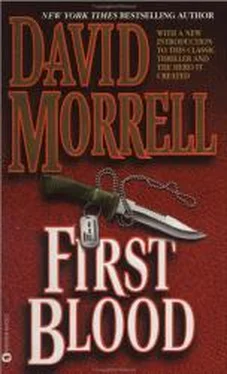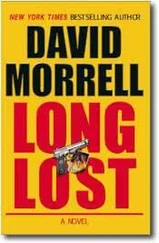When he had five, the motion of raising his arms to break off the boughs became too great a strain on his ribs. He would have liked more, but five would have to do. He lifted them painfully onto the shoulder away from his damaged ribs, and worked back toward the cave, the weight of the boughs making him stagger even worse than he already had been. The climb up the slope of shale was the really bad time. He kept teetering off to one side instead of straight up. Once he lost his footing and slipped face forward, wincing.
Even when he made it to the top, setting the boughs at the cave entrance, he still had to go back down the slope, this time gathering dead leaves and bits of wood that were scattered on the ground. He stuffed what he could inside his wool shirt and filled his arms with large dead branches and carried them back to the cave where he made two trips inside, first with the dead branches he already had in his arms, then with the fir boughs. He was thinking better, doing what he should have done when he had first moved around in the cave. As soon as he was deep in, past where he had wakened, he tested the floor ahead with his feet to be careful of sudden drops. The farther in he went, the lower the roof came, and when he had to crouch, bunching his ribs, he quit. The pain was too much.
This part of the cave was clammy, and he hurried to pile the dead leaves on the floor and spread chips of wood on them and lit the leaves with the matches the old man with the still had given him nights before. The matches had been soaked in the rain and the stream, but there had been time enough for them to dry, and while the first two wouldn't strike, the third did, going out, and the fourth stayed lit, setting flame to the leaves. The flame spread, and he patiently added more leaves, more chips of wood, nursing each lick of fire until they all came together in a blaze that was big enough to add larger chunks of wood and then the dead branches.
The wood was so old that it did not smoke much, and the little smoke that did come off was tugged at by the breeze from the entrance and wafted down the tunnel. He stared at the fire, hands out, warming them, shivering, and directly he looked around at the shadows on the cave walls. He had been wrong. It wasn't a cave, he saw now. Years ago somebody had worked this place as a mine. That much was obvious from the symmetry of the walls and the roof and the flatness of the floor. There were no tools left around, no rusty wheelbarrows or broken picks or rotting buckets — whoever gave up this place had respected it all right, and left it neat. He should have closed the entrance, though. That was strangely careless of him. By now the timber pilings and support beams were old and sagging, and if children ever came in to explore, they might knock against a beam or make too much noise and bring down a part of the roof on them. But what would children be doing out here anyhow? This was miles from where anybody lived. Still, he had found it; others could too. Sure and they would find it tomorrow, so he had better watch his time and leave before then. The quarter moon outside had been up to what he imagined was eleven o'clock. A few hours of rest. That was all he needed, he told himself. Sure. Then he could be gone.
The fire was warm and soothing. He brought the fir boughs next to it and spread them on top of each other in imitation of a mattress, stretching out on them, his bad side towards the fire. Here and there the points of the needles stuck through his clothes and pricked him, but there was nothing he could do about that: he needed the boughs to keep him off the dampness of the floor. In his exhaustion the boughs became soft and restful beneath him, and he closed his eyes and listened to the low crackle of the burning wood. Down the tunnel, water was dripping, echoing.
On first sight of the mine walls he had almost expected to see drawings, paintings, animals with horns, men clutching spears, stalking them. He had seen photographs of something like that, but he could not remember when. In high school maybe. Pictures of hunting had always fascinated him. When he was a young boy at home in Colorado, he had often gone hiking by himself into the mountains, and once when he had stepped cautiously into a cave, rounding a corner, flashing his light, there had been a drawing of a buffalo, just one, in yellow, perfectly centered on the wall. It had looked so real, as if it would bolt at the sight of him and run, and he had watched it all afternoon until his flashlight dimmed. He had gone back to that cave at least once a week after that, to sit there, and watch. His secret. His father had one night beaten him repeatedly in the face for not saying where he had been. Remembering, Rambo nodded his head at not having told. It was a long time now since he had been in that cave, and this place made him feel secret like in the other. One buffalo, high-humped, squat-horned, staring at him. So high up in the mountains, away from its native plains, and how long had it been there and who had drawn it? And who had worked this mine and how long ago was that? The cave had always reminded him of a church, and this place did too, but now the association embarrassed him. Well, he had not been embarrassed when he was a child. First Communion. Confession. He remembered what it had been like to push away the heavy black cloth and slip into the dark confessional, his knees on the padded board, the voice of the priest, muffled, giving absolution to the penitent in the other side of the box. Then the wood slide snicking back and him confessing. Confessing what? The men he had just killed. It was in self-defense, Father.
But did you enjoy it, my son? Was it an occasion of sin?
That embarrassed him more. He did not believe in sin, and he did not like to entertain ideas about it. But the question repeated itself: was it an occasion of sin? And his mind drowsing with comfort from the fire, he wondered what he would have said as a child. Probably yes. The sequence of killings was very complicated. He could justify to the priest that it was self-defense to kill the dogs and the old man in green. But after that, when he had his opportunity to escape, when instead he went after Teasle and shot his deputies while they were in rout, that was sin. And now Teasle would be coming for good, he thought as he had before, and now it was time for his penance. Down the tunnel the water was dripping hollowly.
Down the tunnel. He should have checked it at the first. A mine was a natural place for a bear. Or snakes. What was the matter that he had not checked it already? He took a flaming brand from the fire and used it for a torch down the tunnel. The roof came lower and lower, and he hated stooping, torturing his side, but this needed to be done. He came around a curve where the water he had heard was dripping from the roof, gathering in a pool and draining through a crack in the floor, and that was the end. His torch sputtering to go out, he came to a final wall, a two foot gap in it that angled down, and he decided he was safe. By the time his torch did go out, he was well on his way back to the fire, so near he could see the shimmering reflection of the flames.
But now he remembered there were other things to do. Check outside to be certain the light from the fire could not be seen. Get food. What else? Resting in this mine had seemed so simple an idea at the start, but it was getting more bothersome as he went along, and he was tempted to forget the whole thing and make a try at sneaking through that line of lights down there. He managed as far as the entrance before he swayed so dizzily that he had to sit down. This had to be it. He didn't have a choice. He was going to have to stay for a while.
Just for a while.
The first rifle shot echoed up from somewhere down on his right. Three more came immediately after. It was too dark and they were too far off for him to be the target. Another three shots echoed up and then the faint wail of a siren. What the hell? What was going on?
Читать дальше












